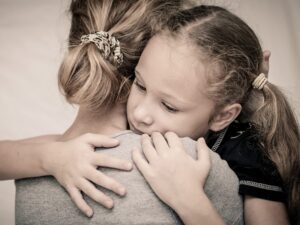Adulting is hard–there’s work, laundry, home repairs, bills, a waning social life, and everything that goes along with having children. On top of that, we are living in a dangerous world that can cause fear and worry. It’s no surprise that parents these days are stressed out. While you try to bear the weight of life’s worries on your shoulders to shield your children, they are not immune to the anxiety you’re experiencing. They see everything.
Children look to their parents for many things, including how to handle tense situations. They learn how to cope with things by example. So, you need to ask yourself, “What kind of example am I setting?” Learning to effectively handle your own stress and anxiety is one surefire way to not pass it on to your children. Easier said than done, right?
Kids and Stress
Occasional anxiety is a normal part of life. Your kid may be worried about a test at school or making new friends. Samantha Rauber, M.A., PLPC, NCC, clinical therapist at Legacy Behavioral Health of Louisiana, shares, “We know that a little anxiety can actually be a good thing when the child can channel the nervousness into a performance such as an athletic event or taking a test. Children can also display developmentally-appropriate fears in certain situations such as meeting a new dog, going to a new school, and even fearing the monster under the bed.” These are short term fears that usually resolve themselves. But for a child with an anxiety disorder, the stress is not temporary. It only grows and becomes worse over time.
Research shows that left untreated, anxiety disorders can cause children to do poorly in school, engage in substance abuse, and make them more likely to suffer from other ailments such as eating disorders and attention-deficit/hyperactivity disorder.
Identifying Anxiety
Big traumatic events or major life changes are more likely to trigger anxiety disorders in children. Moving to a new town or experiencing a divorce can be a handful for an adult, imagine how hard it is for a child. Rauber explains, “When children who are predisposed to having anxiety (or not) meet varying degrees of fearful events, their vulnerable brains can relive the event over and over, and that event can grow scarier and scarier inside their mind, driving the behavior on the outside.” Kids who have a history of mental or physical abuse are also more vulnerable to anxiety.
So how do you know if your child has anxiety? If they experience excessive worry most days or for long periods of time, if they always imagine worst case scenarios, if they have trouble sleeping or experience sleepiness during the day, if they seem irritable or have difficulty concentrating, you may have an anxious child. Rauber adds, “Anxiety can certainly become a barrier to normal functioning in its more severe forms. Some signs are high distress, rapid heartbeat, shakiness, repeating irrational thoughts, disabling fears, panic, and even tantrums.”
Christina Westbrook, MS, PLPC, NCC of Crossroads Professional Counseling, suggests to also look out for chronic complaints of neck pain, headaches, stomach aches, and fatigue. And to pay attention to any changes in behavior such as chronic crying, social isolation, and decreased school performance.
What can you do?
To put it simply, less anxious parents means less anxious children. If you, as a parent, learn methods to manage stress and anxiety, you will be teaching your child how to cope with stress and anxiety as well. “Anxiety breeds anxiety, so the calmer the parent can present in response to a child's anxiety, the better the outcome will be,” says Rauber. Our children take their cues from our behavior. It is important to offer them a positive example when dealing with uncertainty and doubt in any situation.
Once you’ve learned the methods to handle your own anxiety, you must model that for your children. Maintain a calm appearance, even when working on managing your own anxiety. Children soak up everything that you do. By keeping neutral facial expressions and using the right words, you are showing them that this situation is not a catastrophe and everything will be okay.
Westbrook suggests breathing techniques, journaling, and physical exercise to help with stress management, along with the 5, 4, 3, 2, 1 Technique. “Stop and name 5 things you can see, 4 things you can feel, 3 things you can hear, 2 things you can smell, and 1 thing you can taste. Engaging the 5 senses helps us move from sympathetic nervous system activation to parasympathetic nervous system activation which calms us down.”
After mastering these techniques, you will still have moments of frustration and stress when you lose your cool. That’s okay. This too, can be a teaching moment. Take the time to explain your anxiety to your child when things get escalated. Talking to them about your anxiety—explaining the causes and your reaction—lets them know that it’s okay to feel stress, and this stress is manageable.
If you are feeling overwhelmed with your own anxiety and that of your child, it may be time to find a support system. Whether friends or mental health professionals, it is important to have someone you can call on for help. There are even online forums and support blogs that you may connect with.
“Signs that a child may need the help of a mental health professional include suicidal thoughts, extreme changes in behavior, isolating themselves, panic attacks, self-harm, and emotional outbursts,” Westbrook explains.
When it comes to anxiety, the best way to help your children, is to help yourself. Once you learn to be a shining example of cool, calm and collected behavior, your children will follow suit, unless a deeper diagnosis is needed. Westbrook sums it up perfectly for us: “I believe effective stress management involves saying no when we need to, practicing self-care, and striving for balance in all aspects of our lives.” ■





